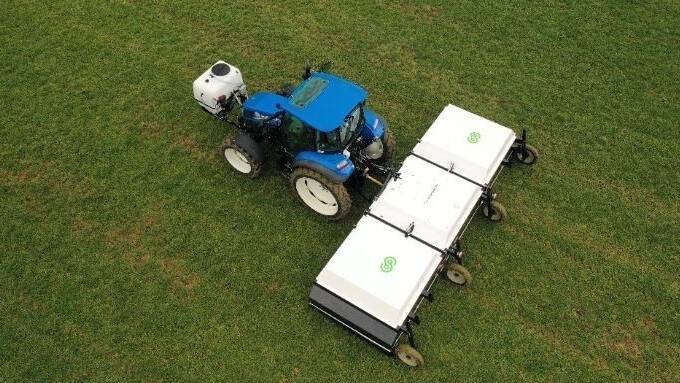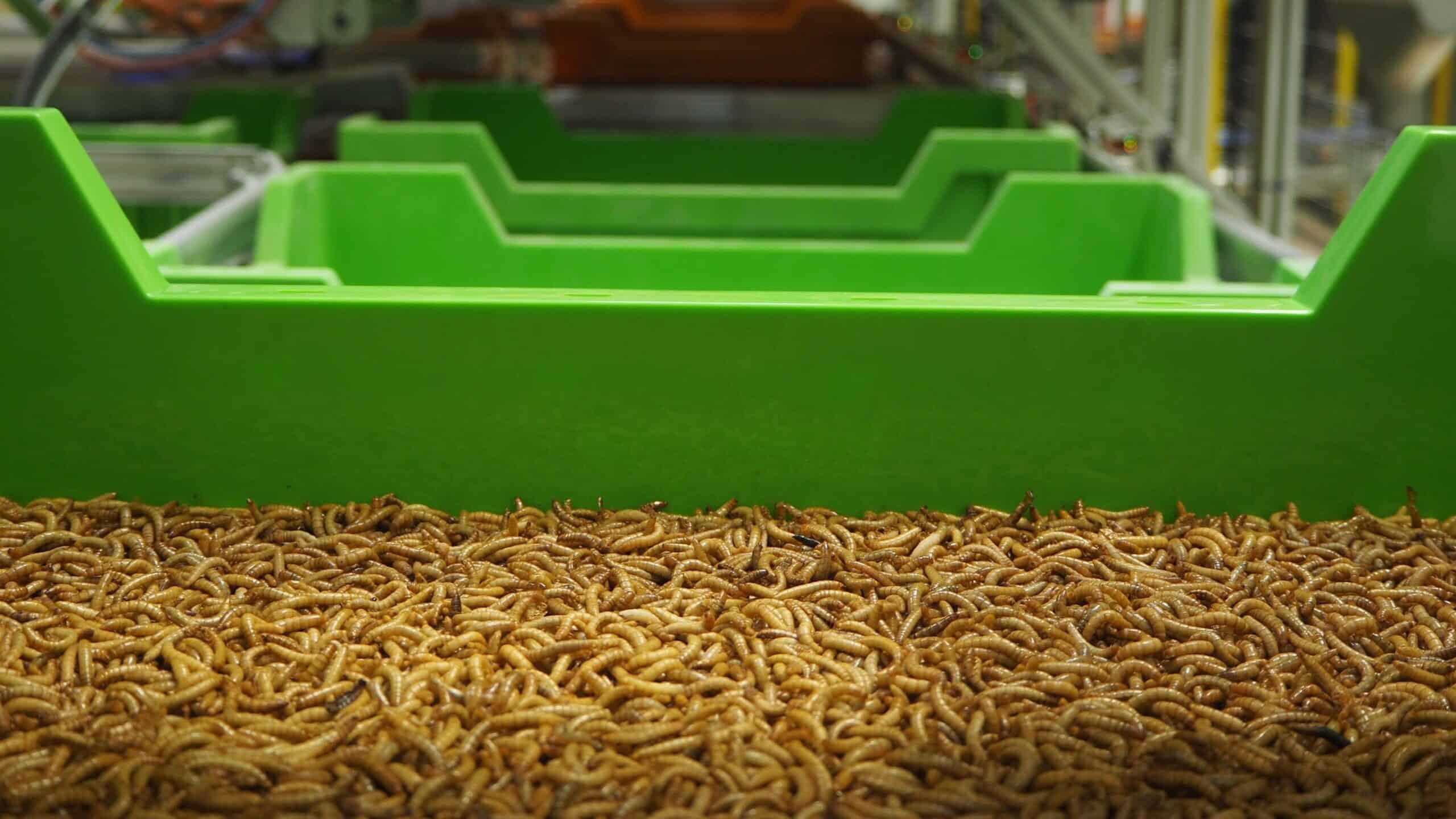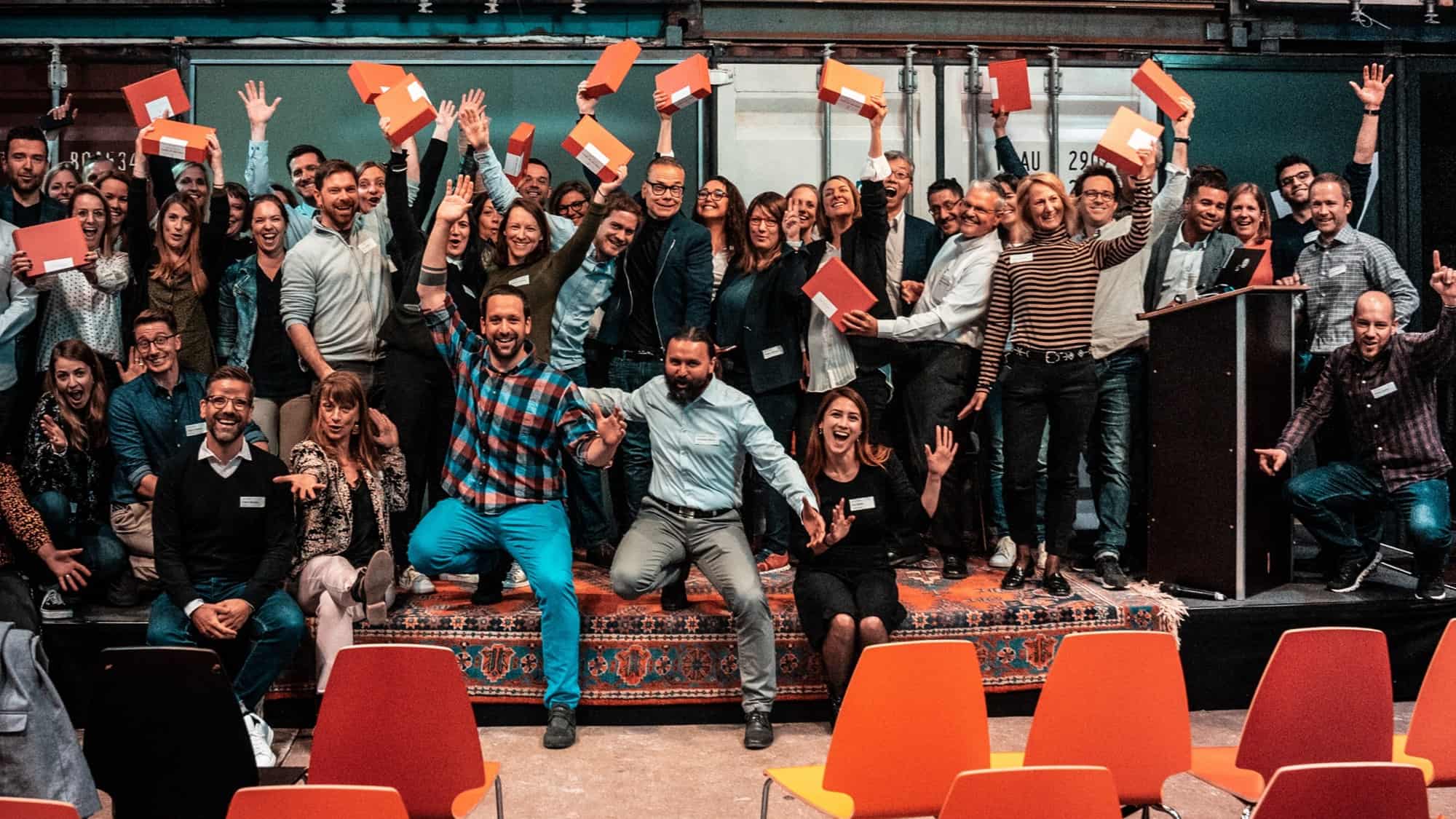Aurélien G. Demaurex, co-founder of Ecorobotix, outlines how the company’s AI-powered precision sprayers reduce chemical use while maintaining or even increasing crop yields. The Swiss startup is a recognized success story with around 250 employees, a proven technology, and hundreds of machines sold globally. In this interview, Demaurex provides insights into the potential of this sustainable agricultural innovation.
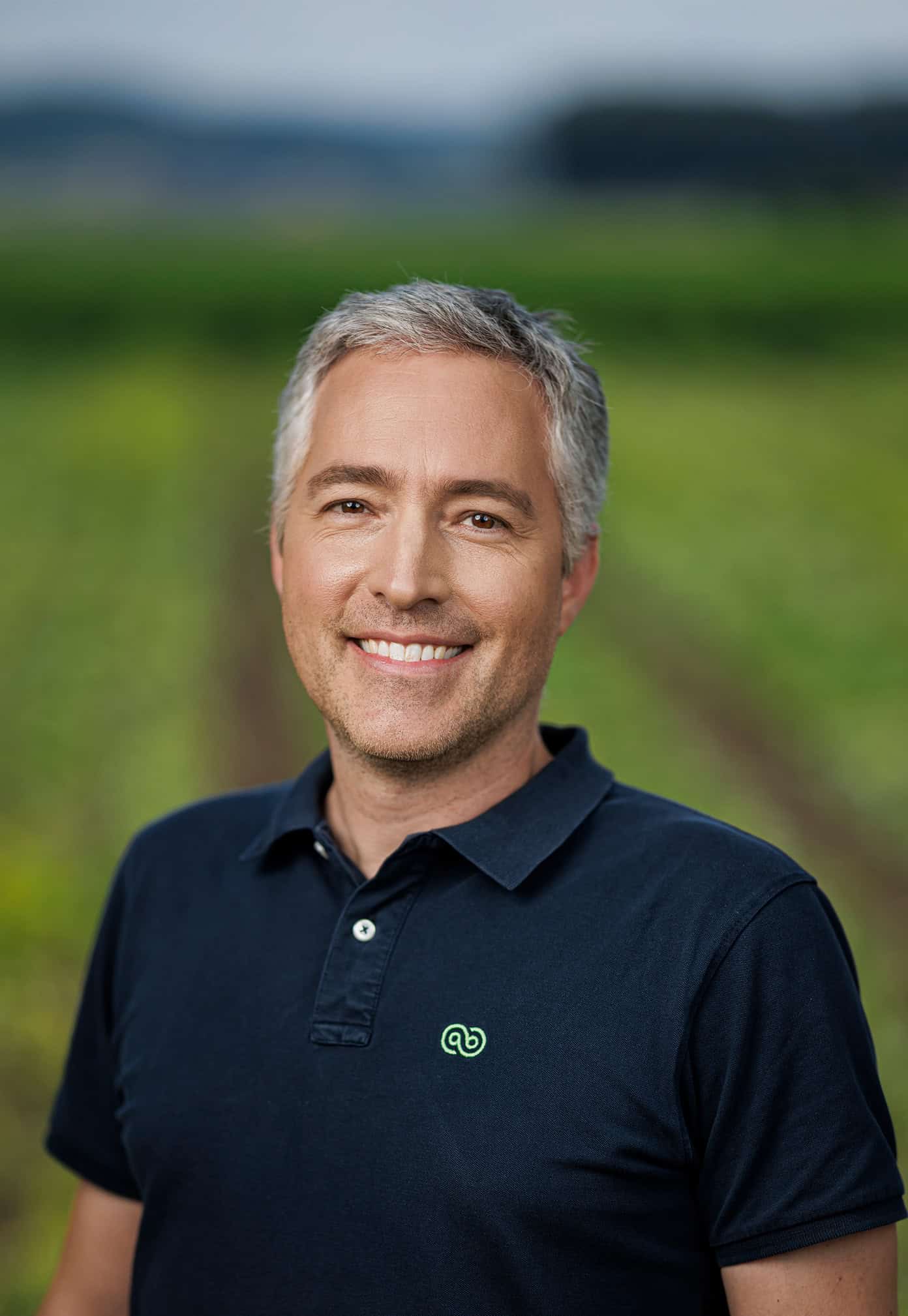
Co-founder, CFO and Vice Chairman, Ecorobotix
Aurélien G. Demaurex grew up in a family of Swiss entrepreneurs. In 2004, he obtained a Master’s in Management from HEC Lausanne and completed leadership programmes from IMD.
He started his career in corporate banking and then switched to humanitarian aid in Africa. His last position was country director for Medair. Back in Switzerland, he co-founded Ecorobotix with Steve Tanner to develop environment-friendly smart machines for agriculture. He is a board member of the Swiss Federation of Businesses (an association of SME committed to sustainability), Innovaud (the investment promotion agency of the Canton of Vaud), and the Swiss Food & Nutrition Valley. Since 2022, he has been a member of the State Parliament of the canton Vaud for the Green Liberal party.
Ecorobotix was founded in 2014 in Yverdon (Switzerland). It has become the market leader in ultra-high precision spraying solutions for agriculture. Its core technology uses artificial intelligence and computer vision to detect and treat plants and weeds on a plant-by-plant basis with herbicides, insecticides, fungicides, and fertilizers. This approach drastically reduces chemical usage (up to 95%) while improving crop yields. Reducing chemicals to feed an increasing population is key to preserving our natural ecosystem. In 2022, a staggering 3.7 million tonnes of pesticides were indiscriminately sprayed across fields worldwide.
The company’s flagship product is the ARA precision sprayer, which has a list price of around 200,000 Euros. It is equipped with high-resolution cameras and NVIDIA GPUs and employs AI trained on a proprietary database of millions of plants for real-time crop analysis. It is 6m wide and sprays with centimeter-level accuracy, covering around 4 hectares (10 acres or 3 football fields) in an hour at 7.2km/h (slow jogging speed).
Ecorobotix employs around 250 staff in Switzerland, Europe, and the US and produces several hundred ARAs annually. In addition to hardware sales, Ecorobotix has recurring licensing revenues for the algorithms that farmers use. Ecorobotix has raised more than USD 80m to date. Verve Ventures first invested in the company in 2016. Ecorobotix is a certified B corporation, reflecting its commitment to sustainability and has been awarded the Efficient Solution label by the Solar Impulse Foundation.
You met your co-founder, Steve Tanner, at EPFL. What led to the creation of Ecorobotix?
Steve grew up on a farm. He was used to helping his parents weed sugar beets manually. After his studies at EPFL, including a PhD, he thought back to those times. He wondered why we were now spreading chemicals everywhere instead of doing what they used to do, manually weeding. His idea was to replace the worker with a robot. So he developed a small autonomous solar weeding robot, but shelved the project for a few years.
I grew up in an entrepreneurial family; my father and uncle were entrepreneurs. Steve and I were at a point in life where the topic of environmental protection was becoming more important for both of us. At that time, Steve was working at EPFL and wanted to hire me as a board member for an NGO doing nature conservation. We discussed this at the Rolex Learning Center at EPFL. I told him that I was involved in politics and creating the Green Liberals in Romandie, and that unfortunately, I had no time for that.
At the end of our discussion, he told me, “By the way, I had an idea a few years ago of an autonomous robot.” And then suddenly, I had time. We tested the idea with potential customers to see how it would go. For about two years, it was a side project. Ecorobotix took off in earnest when we received the first loan from the Foundation for Innovation and Technology and a grant from CTI, which is now Innosuisse, and hired our first employee in 2014.
When I wrote about Ecorobotix in 2018, you were still developing the AVO, a futuristic self-driving weeder. A little later, Ecorobotix pivoted to the ARA, a more standard piece of equipment towed by a tractor. Can you tell me more about that pivot?
Startups always pivot; sometimes, they do small pivots, sometimes big ones. We did two major ones. Initially, we developed an autonomous robot with a robotic arm that drilled into weeds to destroy them. Despite our efforts, it was too slow, so we changed our approach to the autonomous spraying robot you mentioned. We worked on it for a while and it was almost ready for launch. However, farmers told us that even though it’s a great idea, they were unwilling to pay for it. The product didn’t match the way they worked. There were other issues, but the main reason for that pivot was feedback from the market. Farmers said: if you build something we can put behind our tractor, we’ll buy it. If we hadn’t done that, the company would be finished now.
But you did, and you aren’t. Ecorobotix is part of a bigger trend: Technology is changing agriculture. Satellite imagery optimizes planting, sensors track soil conditions, drones monitor crop health, and even autonomous tractors are a reality today. But are farmers ready and willing to use all this fancy stuff?
Many people have an outdated image of farmers. They picture them walking in the field in rubber boots and checkered shirts. The reality is different. Try sitting in a modern tractor! It makes you feel like a pilot in a cockpit full of screens and electronics. Farmers are open to technology and keen to use it, but only if it works. This is the point where they are rightfully conservative. Farmers have 40 harvesting seasons in their lives. They will not risk a harvest on an experiment with something that sounds promising. It has to do the job from day one. There is conservatism in agriculture, but if you deliver value, farmers are keen to use your products.
The ARA launched in 2021. A year later, you stepped down as CEO of Ecorobotix, became CFO, and were elected to the parliament of the canton of Vaud. Why this move to politics?
As I mentioned, politics has always interested me, and I have been involved in politics for over 15 years. When I returned from Africa, I had the chance to launch the party of the Green Liberals, which corresponds to my values, in Vaud. I’ve been active at the communal level for over a decade and got elected to the cantonal parliament with a bit of luck. There are only a few entrepreneurs in Swiss politics. I try to bring the entrepreneurial view to politics, remove barriers and promote entrepreneurship. I think our political system could benefit from a more entrepreneurial drive.
Let’s come back to Ecorobotix. Your ARA precision spraying system reduces the use of pesticides.
Realizing our vision with Ecorobotix is essential. It can be summarized in three “R”s. The first is “reduce”. We do this today, with hundreds of machines in the field. Decreasing the amount of chemicals benefits nature but also significantly reduces farmers’ costs. Spraying less also increases yield. The second “R” stands for “replace”. We are testing how to replace synthetic chemicals with natural chemistry, such as natural acids like vinegars. This would allow us to address the organic farming market. The third “R” is the most exciting and long-term; it stands for “regenerate”. With our ARAs, we have a rapidly growing installed base of sensors in fields worldwide. They are constantly analyzing what is growing in these fields. Regenerative agriculture aims to restore and enhance biodiversity and soil health. It is the opposite of completely sterile monocultures, without any life other than one crop. We want to get to the point where our machines can make decisions that bring back nature to the field, by letting some weeds grow because they’re a habitat for bees and won’t compete too much with the crops.
What is the motivation of farmers to buy an ARA today?
Today, they buy an ARA to reduce costs. With an ARA’s precision, only weeds are sprayed, unlike traditional sprayers, which apply chemicals indiscriminately to the crops. So farmers save a lot on pesticides. We also have clients who report increased yields, for example, that their onions grew bigger. This intuitively makes sense since they no longer apply pesticides to their crops. However, we want a proper scientific evaluation of this claim, which will take some time. Many factors are at play, such as the heterogeneity of soil quality, weather changes, etc. It takes at least five years of data to get hard evidence for a yield increase, which would come on top of the savings they already achieve.
Agriculture is a big industry. Almost 100,000 conventional sprayers are sold every year. How many can Ecorobotix replace?
We are on track to reach half a billion in sales in 2029. We estimate that the market for precision agriculture will grow to around 35 billion dollars by 2050. If we capture 14% of this market, this would translate to 5 billion in annual sales. That sounds enormous, and it is. But you need to understand that Ecorobotix is selling a hardware platform that will allow us to become a future digital advisory company for farmers. It is a logical progression that one day we will be able to tell the farmer: “Based on the data of the last years and the current data, we recommend doing X in 3 days”. X could be weeding or fertilizing with our platform or something else with another system.
Farmers could pay a subscription fee for “optimal farmland-as-a-service”?
Absolutely. New business models will emerge. One model we will test in the future is weeding as a service. You could also envision healthy fields as a service we or others provide. If you think about it, agriculture is exceptionally difficult. As a farmer, you need to have many talents: You need to be a mechanic, a weather forecaster, a chemist, an accountant and many more things. It would make sense to outsource the chemist part to a specialist.
In Europe, the number of small farms is in secular decline, and farm sizes are increasing. Still, your target group must be the largest farms since they can achieve the most significant savings with an ARA and hence the shortest payback periods, correct?
Ecorobotix started selling in Switzerland, where the market is fragmented. In 2023, we began selling in Europe, where, again, some countries have fragmented markets. We observed that farmers with smaller farms bought an ARA and started offering weeding services to their neighbours, and some companies are also adopting this model. In 2024, we began selling in North America, where some farms have a fleet of 30 tractors because they are so big. We have one client who makes more than a billion in revenue annually. Such clients could buy dozens of ARAs. Big farms are essential, but we can serve smaller ones as well. We have established a subsidiary on the West Coast to serve the US better. We are also expanding to Oceania, where we already have our first sales, and target some Asian countries like Japan and South Korea. The next big market is South America. We’re growing very fast. At the same time, we’re increasing the number of crops the machine can be used for. This increases the potential return on investment for the farmers.
As Ecorobotix serves an increasing number of countries, including the US, will production remain in Switzerland?
For the moment, yes. But we’re not producing; we’re instead assembling subsystems we receive from suppliers. We’re in a stage we call “fab-light.” We want to become “fab-less” and outsource hardware entirely in the medium term. As I outlined, we see Ecorobotix as an AI software company in agriculture. We have planned this transition before the tariff discussion in the US. It only accelerated the process.
Let’s talk about the business model in more detail. Farmers buy the ARA but also need to license the algorithms that do the magic in the field. This part of the business needs to grow if you want investors to value Ecorobotix as a software company.
Yes, this business model reflects the substantial value we create for farmers, and we share a part of this value creation. The farmers pay an annual license fee for the algorithms they use; they also pay for them if they want to add more crops. Our number of algorithms increases, as does our installed base. In the US, for example, many farmers ask for thinning algorithms. This is when they sow the seeds closely and remove plants to allow the others to grow better. This is an additional algorithm we’re selling. Our business model can be compared with Apple. In addition to hardware sales, we make recurring revenues from algorithms and are developing new software-based services.
Such as?
I mentioned regenerative farming. With our technology, we could provide farmers with biodiversity credits. Or, since we also avoid CO2, we could monetize these savings. We are already working with South Pole on this. We pursue other ideas with large potential.
Let’s talk about competition. Ecorobotix reduces spraying, but does not completely. Other firms have developed machines that kill weeds with lasers. This approach reduces pesticides by 100%.
It is a clean approach, but it also has downsides. Our machines can also apply fertilizers, which these machines cannot. It is an interesting technology for the organic market, and we’re following it closely. But its main issue is speed. It is very slow, 10 times slower than we are. We have a market share of around 90% in the high-precision spraying market, which is evidence of our strong position.
What about Bayer Crop Science? The company recently unveiled its MagicSprayer, which is similar to the ARA.
It looks very nice on paper, but it isn’t magic. It is a prototype. Bayer has never developed hardware before, which is a different challenge from what they do well. However, Bayer is a serious company, and this move shows what they believe the future is. Other big companies have tried to develop competing products. BASF and Bosch worked together, John Deere bought Blue River, but large companies are less likely to create a disruptive technology like Ecorobotix did.
How big will Ecorobotix need to grow to have a discernible impact on the multibillion-dollar pesticide business?
If we double sales every year, at one point, the pesticide manufacturers will notice. We’re in discussions with all of them; BASF is among our shareholders. They know that a paradigm shift is coming and that they will need to move away from selling volumes. They are interested in developing new molecules suitable for our precision spraying approach.
What difference does that make?
I mentioned that we can work with natural herbicides. Still, precision spraying would allow farmers to use small amounts of aggressive molecules with a very short activity time. These molecules are sprayed on weeds and then lose their potency in seconds as they are exposed to the sun, for example.
With growing interest from such big companies, is a trade sale to one of them the most likely exit route for Ecorobotix?
Ecorobotix is the high-precision spraying category leader. We are growing extremely fast. We want to get to a level few Swiss or European startups achieve: Ruling a category and building a multi-billion-dollar business. Swiss startups often get sold too early. So, no, we don’t want to sell the company to the John Deeres of this world tomorrow. We want to stay independent, so we are raising a lot of money. Our new CEO has written an excellent book about the Deep Tech Nation Switzerland and its entrepreneurial values. With a CEO like Dominique [Megret], we are ready to build a big company.
Written by
Investors
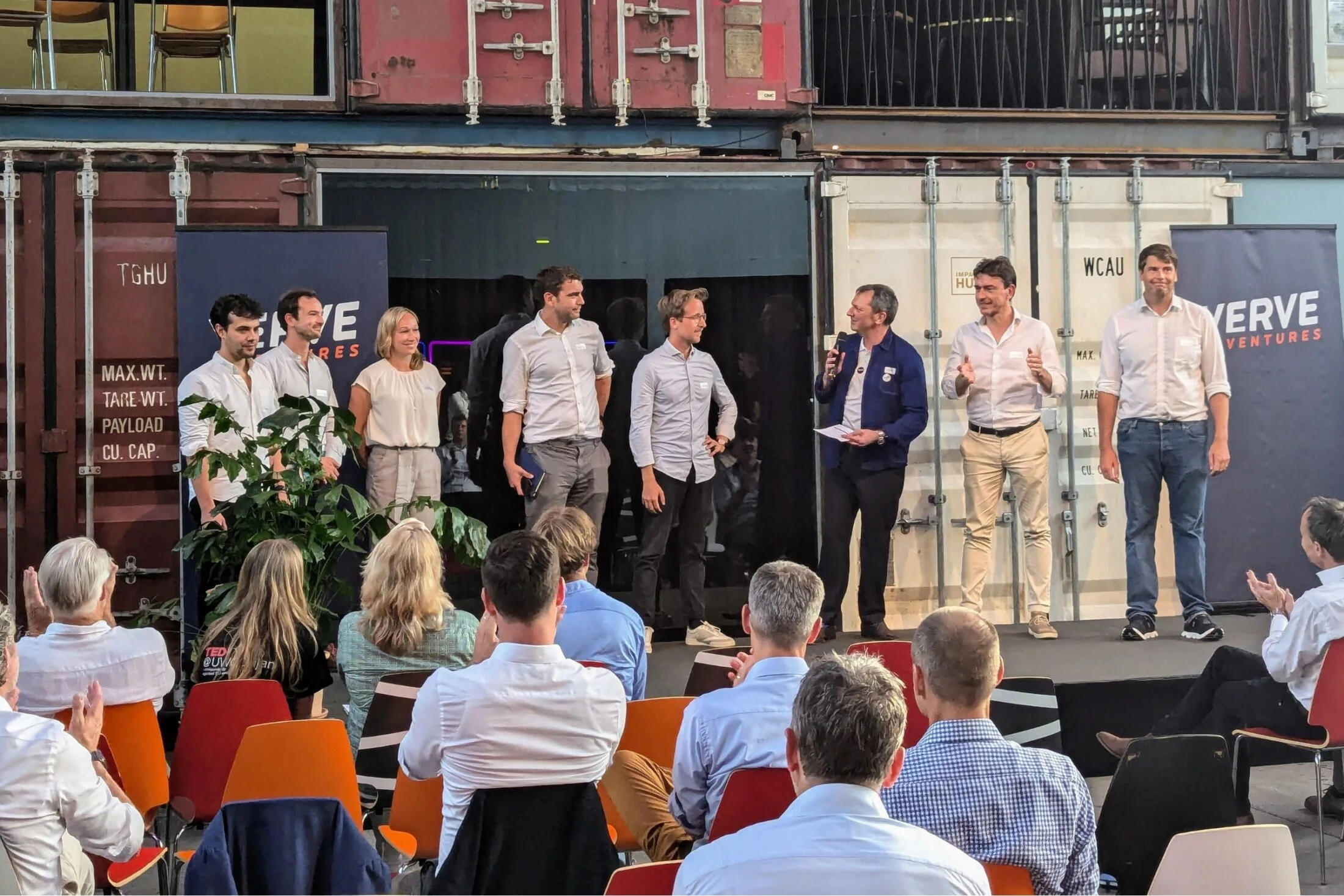
Our sophisticated investors include visionary family offices, leading wealth managers, institutions, founders, and senior executives. These individuals and organizations are all committed to shaping the next generation of innovation.
More News
ecoRobotix raises USD 14.7M Series C
ecoRobotix, a start-up provider of AI-based ultra-high precision farming solutions, has raised USD 14.7 million in its latest Series C funding round. The funding was led by Swisscom Ventures together with Verve Ventures and was strongly supported by existing investors, including CapAgro, 4FO Ventures and BASF Venture Capital.
Meet the global leader in insects
As a child, Antoine Hubert counted butterflies, now he grows worms. Having raised USD 425 million so far for an asset-heavy industrial startup makes him stand out among European entrepreneurs.
“Our goal is to become the category leader in innovation”
In this interview, David Hengartner, CEO of GetKickbox, explains how his early experience as a founder served him in the corporate environment, what exactly an intrapreneur is, and why hippos are dangerous to innovation.
